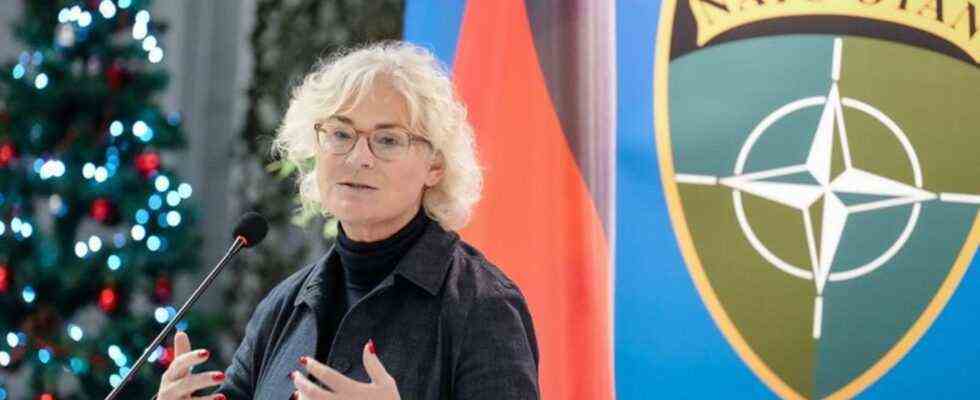Visit to Lithuania
Lambrecht insists on military deterrence during his visit to Lithuania
«My first mission trip leads me to Lithuania quite deliberately»: Christine Lambrecht. Photo: Kay Nietfeld / dpa
© dpa-infocom GmbH
The Christmas visit of the new defense minister to Lithuania is highly political. The SPD politicians assured alliance solidarity – and called for willingness to talk.
A crisis to start with: Defense Minister Christine Lambrecht has assured Lithuania that Germany will support Germany for a credible deterrent in view of the tensions on NATO’s eastern flank.
At the same time, the SPD politician affirmed on Sunday that conflicts with Russia should be settled through diplomacy. “My first mission trip takes me deliberately to Lithuania,” said Lambrecht in Rukla, Lithuania, where she visited German soldiers from the NATO combat unit (eFP) in the country.
The trip takes place against the background of growing tensions with Russia, which are evident in the Russian troop deployment on the border with Ukraine and the migration crisis fueled by Belarus on the borders with Poland and Lithuania. Russia is also demanding security guarantees from the West. It is demanded that NATO withdraw its military infrastructure to the 1997 positions.
Lithuanian Defense Minister Arvydas Anusauskas said at a press conference with Lambrecht that Russia should not be allowed to draw red lines. It is also unacceptable if the leadership in Moscow wants to negotiate areas of influence in Europe or a withdrawal of NATO partners from the eastern member states of the alliance is the goal of the negotiations. He said his country was ready to send arms to Ukraine. “We must support Ukraine with all means and measures, and Lithuania is ready to do that, including the surrender of lethal weapons,” he was translated at the press conference.
In response to the annexation of the Ukrainian peninsula of Crimea by Russia in 2014 after the coup in Ukraine, NATO stepped up the security of its own eastern flank. Joint combat units were stationed in the three Baltic states and Poland as part of an “enhanced forward presence”. They are exchanged every six months, partly because the NATO-Russia Founding Act does not allow Allied troops to be stationed permanently in Eastern Europe.
Lambrecht affirmed the importance of solidarity among the Allies: “We stand firmly by the side of our partners and friends.” The excellent cooperation will be continued. She is convinced that the tense situation must be resolved diplomatically. “At the same time, however, a credible deterrent is required. A very important signal. With its troops at eFP, Germany is making an important contribution to deterrence in the alliance, ”said Lambrecht. “We in NATO are ready to stand up for the security of our allies resolutely and unanimously.”
The common challenges are manifold. “We spoke intensively about the situation on the Belarusian border,” she said. «The situation in Ukraine is serious. We are following them very, very carefully and I can understand and understand the concerns of our Baltic allies when you feel threatened. “
Germany provides around half of the 1200 men and women of the multinational unit in Lithuania and runs it as a so-called framework nation. With the trip, Lambrecht also maintains a tradition of its predecessors, who always tried to pay a visit to one of the missions abroad during Advent. The NATO battle group is housed in a barracks in the city of Rukla together with Lithuanian units. Dutch, Belgians and Norwegians are also involved, as well as soldiers from the Czech Republic and Luxembourg.
Before the trip, Lambrecht had already urged personal sanctions against Russian President Vladimir Putin and his confidants in response to the military escalation in the border area with Ukraine. “Right now we have to target Putin and those around him. Those responsible for the aggression have to feel personal consequences, for example that they can no longer travel to the Paris Champs Élysées to shop, ”Lambrecht told the“ Bild am Sonntag ”. «The aggressor is Russia. We must do everything possible to stop an escalation. This also includes the threat of harsh sanctions. “

